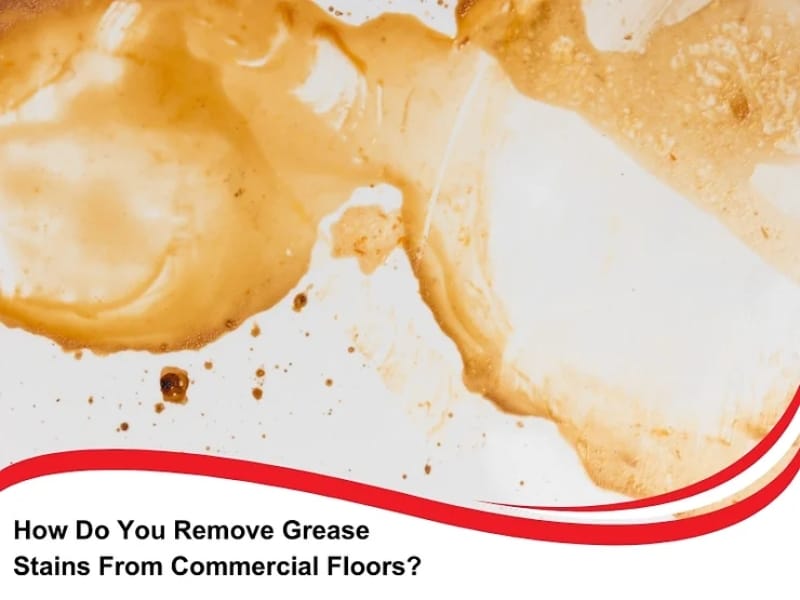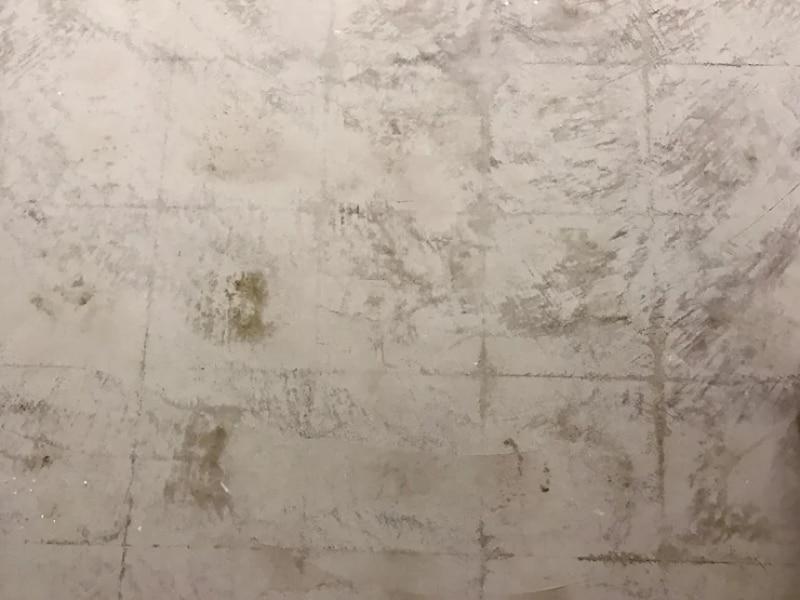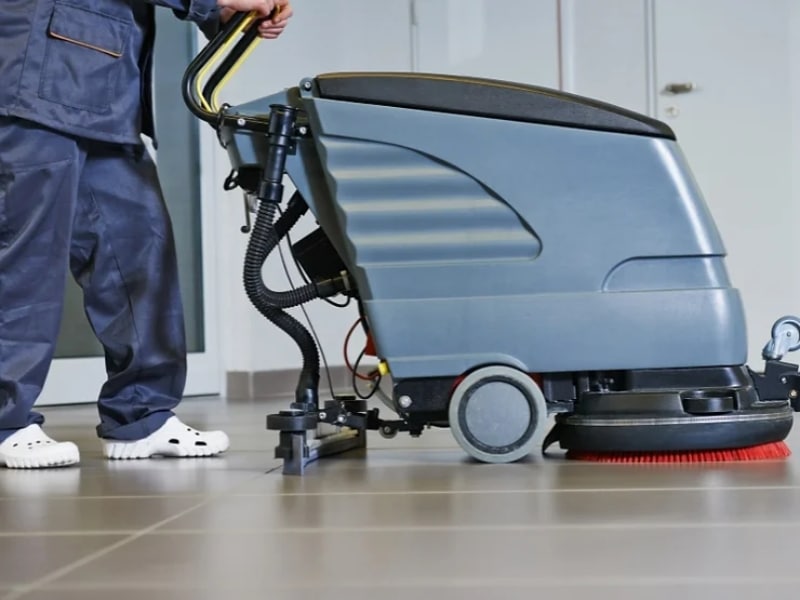How Do You Remove Grease Stains From Commercial Floors?

Grease stains on commercial floors are a common issue that businesses face, especially in high-traffic areas like kitchens, hallways, or warehouses. These stains not only make the floor look unsightly but can also pose safety hazards and make the area harder to clean. To ensure your business maintains a clean, professional environment, it’s important to know the best methods for grease stain removal on commercial floors. This article provides expert advice on how to tackle grease stains, prevent their recurrence, and maintain the overall cleanliness of your commercial space.
Why is it important to remove grease stains from commercial floors?
Grease stains on floors can be more than just an aesthetic concern. Here’s why you should act promptly:
- Safety: For businesses in the food industry, maintaining a clean and safe environment is crucial. Adhering to food facility sanitation performance standards is important for preventing grease build-up and ensuring compliance with health regulations, keeping both employees and customers safe.
- Hygiene: Grease attracts dirt, dust, and bacteria, which can negatively impact the cleanliness and hygiene of your commercial space.
- Professional Appearance: A clean, well-maintained floor is crucial for creating a positive impression on clients, customers, and employees.
- Preventing Damage: If left untreated, grease can degrade the quality of your flooring over time, leading to costly repairs or replacements.
What are the common causes of grease staining on commercial floors?
Grease stains can appear for various reasons, especially in commercial spaces. Some common causes include:
- Kitchen Spills: Cooking oils, butter, or sauces can spill onto the floor in restaurants, cafes, or any food-related business.
- Industrial Equipment: Warehouses or factories may experience grease stains from machines or heavy-duty equipment.
- Employee Workstations: Offices or workspaces with machinery or production lines may also be prone to grease spots.
- Customer Traffic: In retail settings, grease can be tracked from outdoor areas or maintenance equipment.
How can you identify grease stains on commercial floors?
Grease stains can be tricky to spot, especially if they blend in with the floor’s color or texture. Here are some signs to help you identify grease stains:
Shiny Spots: Grease often leaves a slick or shiny residue on the floor.
Darkened Areas: Over time, grease stains may darken due to dust or dirt accumulating on them.
Sticky Residue: Grease may feel sticky to the touch, even after the surface appears clean.
Slippery Zones: If you notice unusually slippery patches, it could be due to a build-up of grease.

What are the best methods for removing grease stains on commercial floors?
Removing grease stains requires the right cleaning methods. Here are some of the best approaches:
- Dish Soap and Hot Water: Mix dish soap with hot water to break down grease. Apply the solution to the stained area and scrub with a soft brush.
- Baking Soda Paste: Combine baking soda and water to create a paste. Apply it to the stain, let it sit for 10–15 minutes, and then scrub it off.
- Commercial Degreasers: For tougher stains, use a professional-grade degreaser. To avoid damage, make sure the product is suitable for your floor type.
- Vinegar Solution: Mix equal parts vinegar and water to remove grease stains. Vinegar acts as a natural degreaser and can help dissolve the grease.
- Steam Cleaning: For stubborn stains, a steam cleaner can effectively lift grease and grime from commercial floors.
Moreover, If the grease stain has spread to carpeted areas, incorporating the best carpet cleaning techniques can help remove the stain without damaging the fabric.
How do you safely remove grease stains without damaging your floors?
When removing grease stains, it’s crucial to ensure the cleaning method doesn’t harm the floor. Here’s how to do it safely:
- Test the Cleaner First: Always test any cleaning solution in an inconspicuous area to ensure it won’t damage the floor.
- Use Gentle Scrubbing Tools: Avoid using harsh scrubbing brushes or steel wool, which can scratch or damage the floor’s surface.
- Choose the Right Cleaner for Your Flooring: Different floors, such as tile, hardwood, or vinyl, may require specific cleaning agents to avoid damage.
- Avoid Over-Wetting: Excess moisture can seep into certain types of flooring, potentially causing warping or other damage. Always dry the area after cleaning.
Why should you consider professional grease stain removal services?
While DIY cleaning methods can be effective, there are several benefits to hiring professional cleaning services:
- Expertise: Professional cleaning teams have the experience and knowledge to handle grease stains efficiently, ensuring optimal results.
- Time-Saving: Outsourcing grease stain removal allows your staff to focus on their primary tasks, improving overall productivity.
- Advanced Equipment: Professional cleaners use high-quality, commercial-grade cleaning equipment that’s more effective at removing stubborn grease stains.
- Consistent Results: Professionals ensure thorough, consistent cleaning every time, leaving your floors spotless and safe. With expert floor cleaning solutions, you can trust that your floors will be in the best possible condition.

How can regular commercial cleaning help prevent grease build-up?
Prevention is always better than cure, and regular commercial cleaning plays a crucial role in preventing grease build-up. Here’s how it helps:
- Frequent Cleaning: Regular cleaning reduces the chance of grease accumulating and becoming stubborn.
- Routine Maintenance: With regular care, grease stains are less likely to set into the floor, making them easier to clean when they do appear.
- Improved Hygiene: A consistent cleaning schedule helps maintain a hygienic environment by removing grease and other contaminants.
- Floor Longevity: Regular cleaning extends the life of your floors by preventing dirt and grease from damaging the surface over time.
How often should you schedule professional cleaning for grease stain removal?
The frequency of professional cleaning depends on your business’s specific needs. Consider the following guidelines:
- High-Traffic Areas: If your business deals with high traffic or works in industries like food service or manufacturing, you should schedule cleaning services more often.
- Heavy Equipment: Spaces with machinery or equipment that regularly cause grease build-up require more frequent cleanings.
- Routine Inspections: Even if you don’t notice grease stains, regular inspections and cleaning can catch issues before they become significant.
Need help with floor care?
JBM Janitorial offers professional commercial cleaning services, including grease stain removal for all types of commercial floors. With years of experience in maintaining the cleanliness and integrity of office buildings, retail spaces, healthcare facilities, and more, we can help you create a clean and safe environment for your employees and clients. Reach out to JBM Janitorial today to schedule your next cleaning session!
